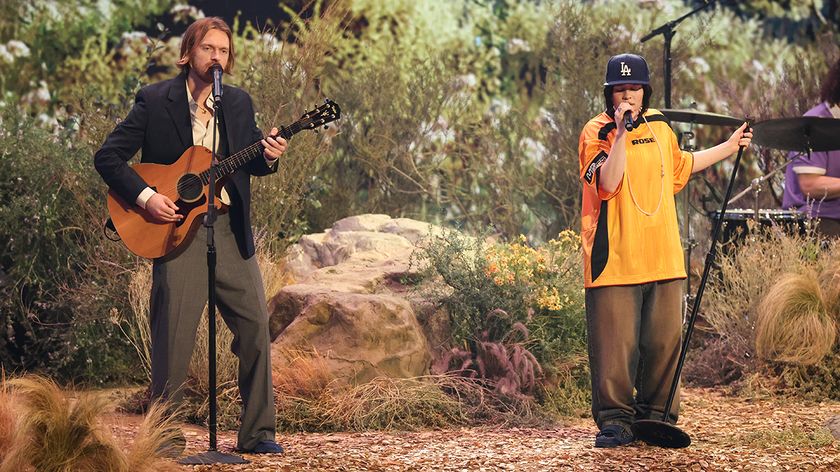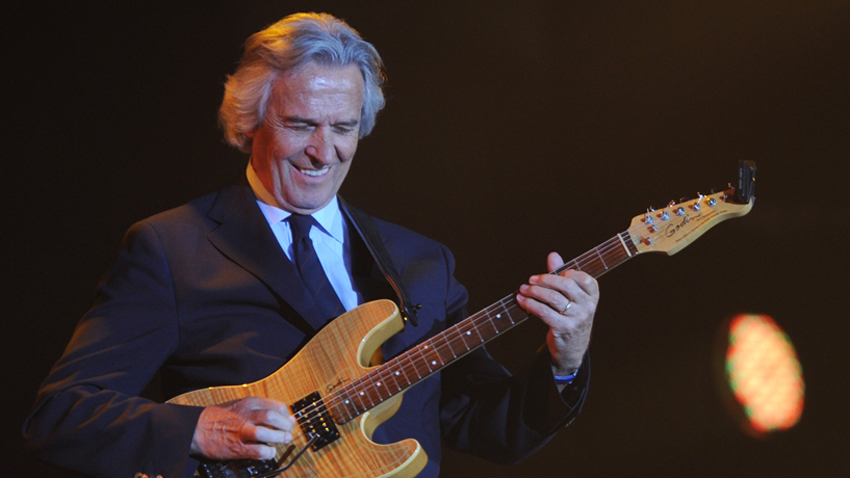
On 16 October, John McLaughlin will release his 24th solo album, Now Here This, a stunning set of originals that finds the world-renowned guitar legend playing with the kind of unbridled musical spirit that prompted even Jeff Beck to declare him to be "the best guitarist alive."
"It's a very special album, and I'm so proud of it," says McLaughlin, brimming with good-natured cheer as he kicks back in his hotel room just off Maryland's Chesapeake Bay. "You know, I'm 70 years old, and I still feel like there's so much I have to do. There's a lot to discover, so many questions to answer."
On the subject of questions, we came armed with a bunch of them - from MusicRadar readers, no less. Plus, we threw in an all-time favorite of our own, one which has been known to break up bands, friendships and marriages for the past five decades. "Go for it," McLaughlin says with a laugh. "I'm feeling good and ready."
Jim Williams asks, What kind of guitars are you playing these days?
"I've got a PRS. The wood is so beautiful - it's like violin wood. It's got the McCarty pickups. Last year, I got a prototype of a WiFi guitar MIDI. How's that for amazing? I don't have it installed on the PRS yet; it's installed on my Godin Freeway. On my new record, I used that guitar for the MIDI, and for the electric guitar I used the PRS.
"I'll tell you about my rig, as well. I don't use an amp anymore - I use tube preamps. From there I go into the monitor and the front of house. This Zendrive pedal is really fantastic. It's only got one tube in it, but it's very good. I used it on the new album."
Lee Freeman asks, Why Now Here This rather than Now Hear This?
Get the MusicRadar Newsletter
Want all the hottest music and gear news, reviews, deals, features and more, direct to your inbox? Sign up here.
"Because 'Now Hear This' sounds like the old 17th Century: 'O ye, o ye! Now hear this!' I'm not admonishing anybody. It's actually a lot more zen, the title. At my age, every moment is real. So there's no message, but that's it. Now - this is the moment we have. Here - that's the moment where we are. This - that's what's in front of us. Sure, it's a double meaning with the words."
Terry Eagleton says, I understand there's an influence of Indian music on your new record. What did you think of George Harrison and how he incorporated Indian music into his work?
"This is not a new thing for me, my use of Indian music. I recorded an album in India a few years ago, Floating Point, and the drummer on that, Ranjit Barot, is now the drummer in my band. Ranjit is Indian and he grew up with Indian music, but he plays Western drums, so he's got the best of both worlds. He's simply outstanding. I think this band has never sounded better, and I'm so happy with the new record.
"George Harrison. I loved George. I mean, we're both two old hippies, aren't we? [laughs] Like George, I had the privilege of studying with Ravi Shankar. Ravi taught me about North Indian music, South Indian music - so many things. What George did was wonderful. The movie that Scorsese made on him - you know, I'm not even a fan of Scorsese, but I really enjoyed that documentary. The way he treated George was beautiful. We see him as the special person he was. What he did on the song Within You, Without You was fantastic. He wasn't a great sitar player, but it didn't matter. He brought the color.
"That was an important time in the '60s. We were all trying to answer big questions: Who are we? What is real? What is the meaning of life? The Beatles, The Beach Boys - people were looking East for inspiration. George was the most well-known of the musicians doing that, so his work was very special."
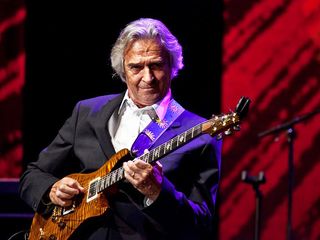
McLaughlin on stage with his new Paul Reed Smith Private Stock Violin guitar. © Andrea Palmucci
Stelly D asks, How do you go about recording nowadays? Do you embrace a lot of new technology, or are you fairly old school?
"I absolutely love the new technology. Everybody records straight to disc now. Recording to tape… it's probably been 15 years since I've seen a tape machine in a studio. So I do direct to disc recording, and of course, there's some wonderful plug-ins now - it's tremendous. The speed of mixing is unbelievable.
"I know a lot of people overdub while recording, but I still like to play live. You can't re-create a live vibe. You may be able to perfect your performance with overdubs, but you can't improve a feeling. Whether we're on stage or in the studio, we play live - and we use the new technology."
Calvin Wong says, I remember an interview in Total Guitar in which you said, as a child, you took your guitar to bed and played until your fingers bled. Any tips to prevent this from happening to me?
[laughs] "As long as you've got a mom who will separate you from the guitar, you should be cool. That's what my mom had to do. I don't know. I was 11 years old, and I had been playing classical piano for three years, and suddenly the guitar came and landed in my arms. I fell in love with that instrument, and I still love it today. I love it so much. The guitar l learned on was probably worth $4 or something, but it was priceless to me. It meant so much. So don't worry if you hurt your fingers. They'll feel good eventually. Play."
Michael Mott says, Words of wisdom on right-hand technique would be most welcome.
"Right-hand technique, yes. There are essentially two different approaches: One - you support your right hand. Two - you don't support your right hand. I'm of the school where my right hand is supported on the bass side part of the bridge, but it's kind of floating over it. You have to find the way that works. I've had students who have developed cramps because of how they pick.
"You've got to relax. At the same time, you have to have a certain amount of tension. You have to attack the note, but not aggressively. Coax the note out with your pick. Work on your poise. You have to find that middle spot where your hand isn't floppy but it isn't still and rigid."
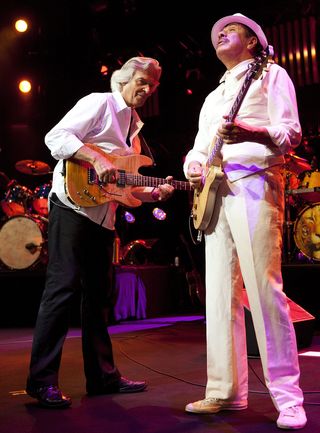
On stage with old friend and collaborator Carlos Santana at the Montreux Jazz Festival, 2011. © LAURENT GILLIERON/epa/Corbis
Olly Rybarczuk asks, What was it like to play with Miles Davis?
"What's it like to play with your guru? I loved Miles Davis since I was 15. I had just turned 27, and there I was in the studio with him. And I was nervous! [laughs] I was sweating heavily, let me tell you. But what do you do when you're confronted by somebody you revere? It was incredible. He was so gracious. In that first recording session, for In A Silent Way, he pulled stuff out of me that I didn't know was there. This was his genius. After that recording session, I saw him a lot. I'd go over his house, and I always brought my guitar. He wanted to pick my brain, because he'd never had a guitar in the band before. Eight months later, a lot of that stuff went into Bitches Brew."
Stratoblogster Guitar Blog asks, Who are some of your favorite contemporary guitarists?
"Contemporary? There's a few. Jeff Beck, of course. For me, he's my all-time favorite guitar player. We go back about 40 years. Even today, he's such a beautiful guitar player. The newer ones… Wayne Krantz. Very nice guitarist. Jimmy Herring is another great player.
"But I'll tell you, I heard a 13-year-old guitar player named Quinn Sullivan, and he's unbelievable. He plays like Jimi! A 13-year-old and he plays so good. I saw him in Switzerland, and I couldn't believe what I was hearing. He's a protégé of Buddy Guy's. Buddy's taking him everywhere. And the kid can sing, too. Thirteen years old. Far out, huh?"
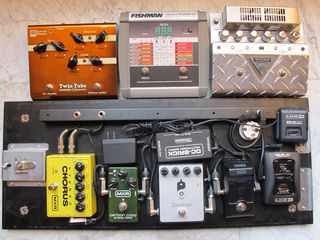
John's pedalboard, featuring Zendrive, Seymour Duncan Twin Tube and Mesa/Boogie V-Twin preamps. Also housed is a wireless MIDI for guitar invented by Andras Szalay and distributed by Fishman Associates.
Electric 6 wants to know, What do you do when you're in a rut with your guitar playing?
"I don't really have ruts anymore. I've had them in the past, but I've been playing the guitar for 60 years now. Sixty years is a long time. [laughs] The thing is, in a way, you can call me a guitar player, but that's just what I do. What I do is play the guitar - it's what I love, even now. I still find new things. I wake up and pick up the guitar, and even if I don't have anything in my head, I'll discover something incredible. This happens to me every day. Every day, I discover something utterly unbelievable when I play. In the end… I don't think we can get to the end. I'm going to die saying, 'Can I have one more day?' [laughs] Because the pleasure of discovery is just unequalled."
Alex Wallington says, I love the album you did back in the day with Carlos Santana, Love Devotion Surrender. What did you learn about the guitar from playing with Carlos?
"Oh, Carlos, first of all, he loved Jimi, just like I do. But Carlos is a Latin soul, so he's got that side of him. He had something about the way he played. Even in the mid-'60s, he had a sound and a lyricism that I absolutely loved. Our styles of guitar playing are so different, but we revere many of the same people. The way he would play was the perfect complement to what I would do. We played last year in Switzerland, and we performed some of the songs from Love Devotion Surrender, and it was like putting on an old pair of shoes. It was lovely. We went on stage, and it was like time had stood still. A very special guitar player, and a very special human being."
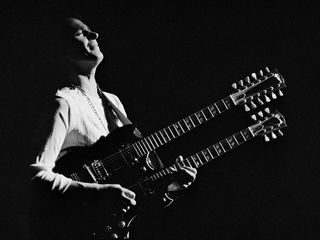
Feeling blissful in 1973 with a Gibson EDS-1275 double neck. © Jeff Albertson/CORBIS
Nick Able asks, What's a day in the life of John McLaughlin like?
[laughs] "Well, OK, I'll tell you how I spend a typical day. I wake up maybe 6:20 in the morning, and by 6:30 I'm meditating. I do about 15 minutes, maybe 20, sometimes longer - on weekends it's longer. Then I get breakfast ready. I wake up my boy and my wife and have breakfast with them. We live in the South of France, so it they're not up yet, I might go out and have a croissant or pain au chocolat.
"Next, I might do some administrative work, but what I like to do first is pick up the guitar. I want to play my instrument. For at least 45 minutes I'll play before I do anything else. On the weekend, I take my bike out for a ride. I go up about 1500 feet, over a distance of 10 miles. It's no fun, but I'm very happy when I get to the top. [laughs] It's the only way I stay fit. Or I might go for a swim or play some tennis.
"After that, then I have some more administrative work and some e-mails to take care of. I like to cook, so quite often I cook dinner. That's it. After dinner, we might watch a movie, go for a walk… whatever. There's a day in my life."
Finally, we have one of our own questions: The Beatles or The Stones, and why?
"The Beatles or The Stones? Oh, that's a good one. Well, you know, there's no comparison. The Stones are just like… I don't even know why they're still so big. I was at the first audition they had at this club in London, way back in the early '60s. They were so out of tune - and out of time! I said, 'What is going on here?' But I did get to know the Stones later, and especially Mick, and he's a really good guy. He's got charisma in spades, and they… they have their legend. They built their legend and they'll live off of it.
"The Beatles, they brought a whole new dimension to pop music. Of course, the psychedelic period is much more interesting to me, starting with Rubber Soul and on to the White Album. Great, great records. I was such a Beatles fan. I was very sad when they broke up. And I loved George and the Indian music that he wrote. We both shared similar kinds of orientations.
"So musically, for me, when I hear the Stones and I hear something like Sgt. Pepper, which is a masterpiece, I know which one I think is really great music. And it's personal in the end, but there you have it."
Joe is a freelance journalist who has, over the past few decades, interviewed hundreds of guitarists for Guitar World, Guitar Player, MusicRadar and Classic Rock. He is also a former editor of Guitar World, contributing writer for Guitar Aficionado and VP of A&R for Island Records. He’s an enthusiastic guitarist, but he’s nowhere near the likes of the people he interviews. Surprisingly, his skills are more suited to the drums. If you need a drummer for your Beatles tribute band, look him up.
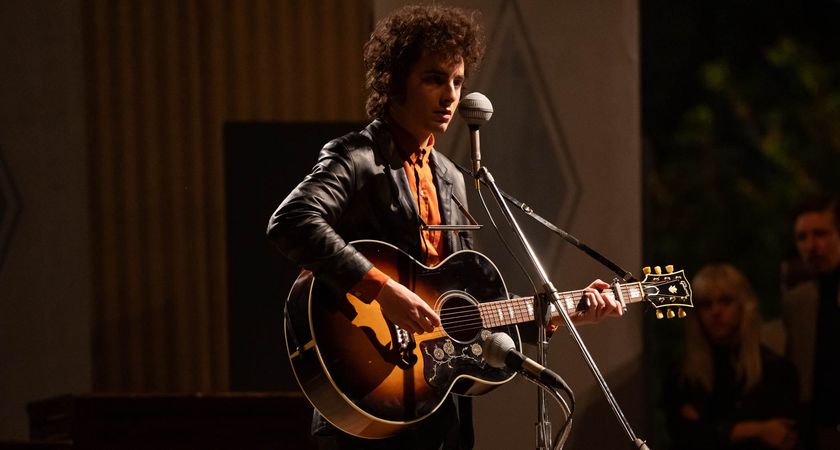
“I loved that he showed up with a $200 guitar… It’s humble”: Timothée Chalamet learned to play guitar for his Oscar-nominated role in Bob Dylan biopic on a beginner Yamaha acoustic
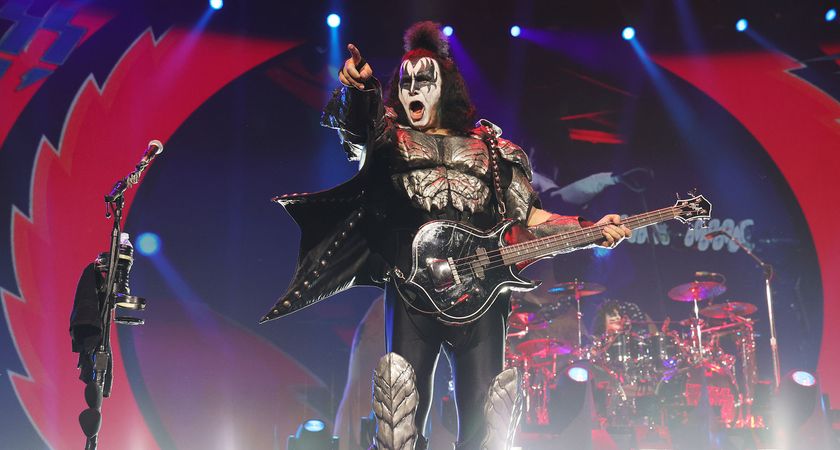
“AI is about as close to reality as you can ever imagine”: Gene Simmons discusses the prospect of a virtual KISS and says the “future of entertainment is here”
Most Popular








